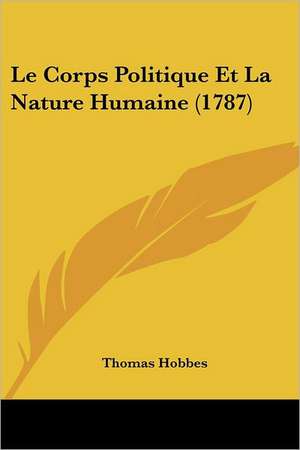Le Corps Politique Et La Nature Humaine (1787)
Autor Thomas Hobbesfr Limba Franceză Paperback – 26 aug 2009
Preț: 268.02 lei
Nou
Puncte Express: 402
Preț estimativ în valută:
51.31€ • 52.80$ • 43.25£
51.31€ • 52.80$ • 43.25£
Carte tipărită la comandă
Livrare economică 24 februarie-03 martie
Preluare comenzi: 021 569.72.76
Specificații
ISBN-13: 9781104987848
ISBN-10: 1104987848
Pagini: 316
Dimensiuni: 152 x 229 x 17 mm
Greutate: 0.46 kg
Editura: Kessinger Publishing
ISBN-10: 1104987848
Pagini: 316
Dimensiuni: 152 x 229 x 17 mm
Greutate: 0.46 kg
Editura: Kessinger Publishing
Notă biografică
Thomas Hobbes (5 April 1588 - 4 December 1679) was an English philosopher, considered to be one of the founders of modern political philosophy. Hobbes is best known for his 1651 book Leviathan, which expounded an influential formulation of social contract theory. In addition to political philosophy, Hobbes also contributed to a diverse array of other fields, including history, jurisprudence, geometry, the physics of gases, theology, ethics, and general philosophy. The English Civil War began in 1642, and when the royalist cause began to decline in mid-1644, some of the king's supporters fled to Europe. Many came to Paris and were known to Hobbes. In 1647, Hobbes took up a position as mathematical instructor to the young Charles, Prince of Wales, who had come to Paris from Jersey around July. This engagement lasted until 1648 when Charles went to Holland. The company of the exiled royalists led Hobbes to produce Leviathan, which set forth his theory of civil government in relation to the political crisis resulting from the war. Hobbes compared the State to a monster (leviathan) composed of men, created under pressure of human needs and dissolved by civil strife due to human passions. In 1658, Hobbes published the final section of his philosophical system, completing the scheme he had planned more than 20 years before. De Homine consisted for the most part of an elaborate theory of vision. From the time of the Restoration, he acquired a new prominence; "Hobbism" became a byword for all that respectable society ought to denounce. The young king, Hobbes' former pupil, now Charles II, remembered Hobbes and called him to the court to grant him a pension of £100.
